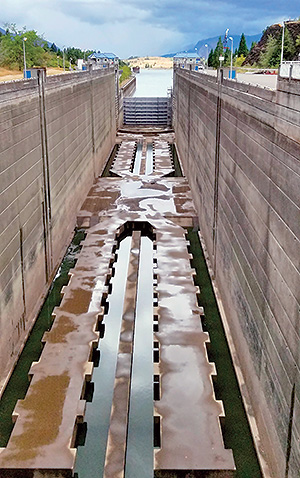forum
library
tutorial
contact

Bonneville Lock Closure Hinders
Supply Chain in Pacific Northwest
by Staff
Transport Topics, September 13, 2019
|
the film forum library tutorial contact |

|
Bonneville Lock Closure Hinders
by Staff
|
 More than 100,000 tons of exports -- including grain shipped through Kalama and Longview, Wash. -- will be stranded upriver at the Bonneville Dam for about a month as the Army Corps of Engineers repairs a damaged navigation lock that river users call a "critical link" of the Columbia River trade corridor.
More than 100,000 tons of exports -- including grain shipped through Kalama and Longview, Wash. -- will be stranded upriver at the Bonneville Dam for about a month as the Army Corps of Engineers repairs a damaged navigation lock that river users call a "critical link" of the Columbia River trade corridor.
The corridor supports about 40,000 area jobs, including steamship agents, launch companies, river pilots and port positions, said Kate Mickelson, executive director for the Columbia River Steamship Operators Association.
The temporary lock closure also puts some of those jobs on hold because the lock closure is a "break in the supply chain," she said.
"The Columbia River trade corridor is the lifeblood of our regional economy, supporting 50 million tons of foreign trade at a value of over $24 billion annually," Mickelson said.
"[The situation] shows the critical need to fund a comprehensive maintenance and rehabilitation program for the eight locks on the Columbia and Snake rivers," said Kristin Meira, executive director of the Pacific Northwest Waterways Association.
"This river system is one of the region's and nation's chief cargo transportation arteries, and the failure of any one lock can have a huge and potentially catastrophic impact on the economy of the Pacific Northwest and a number of sectors throughout the nation," Meira said.
The Portland District of the Corps closed the lock Sept. 5 after lock operators found cracked concrete that was causing the lock to leak. The closure disrupts the system that typically moves about eight to 10 ships daily past the dam, which is the farthest downstream of all the Columbia River hydroprojects.
The Corps has awarded an emergency repair contact to a Portland-based construction company, which has started to repair the damage. The lock is expected to reopen at 10 a.m. on Sept. 30.
"It is not lost on anyone in the Portland District that this outage has tremendous impacts to Columbia River users," Portland District Commander Col. Aaron Dorf said in a prepared statement. "Between now and Sept. 30, our teams will be working around the clock to construct the new sill to restore Columbia River traffic."
In the meantime, thousands of tons of product -- most of which is grain -- are stuck behind the dam on tugs and barges, Meira said. (There also is at least one large cruise vessel stuck at the lock, she said.)
That means those products are stalled from reaching the ports and companies they are headed to.
Grain shipments, such as those stranded at the dams, support business at the ports of Kalama and Longview. Those two Cowlitz County ports lease berths to three grain terminals: Temco and Kalama Export in Kalama and Export Grain Terminal in Longview.
The Kalama Export declined to comment on the lock closure's effect on the company, and representatives with Temco and EGT did not return calls for comment.
About 75% of the wheat shipments stalled by the lock closure are being handled by Tidewater Barge Lines, said the Vancouver-based company's spokeswoman, Jennifer Riddle. Tidewater has halted its tug and barge operations as the Corps repairs the lock, she said.
"With that [halted production], we have had to temporarily lay off those crew members that would normally crew those tugs. … If we are able to find work that is strictly above the Bonneville Dam, they will be called back in," Riddle said.
Nearly 77% of the company's marine crew has been "sent home or temporarily laid off," she said.
And the anchored vessels and out-of-work crew members are only two examples of the "ripple effects" that could be felt as a result of the lock closure.
"The supply chain on the river is meant to be in constant motion, and the stoppage of one link has ripple effects across the entire system," Meira said.
The Snake and Columbia river system is the nation's No. 1 export gateway for wheat and No. 2 for corn and soybean exports, Mickelson said. Nearly 15.4 million tons of wheat and 8.8 tons of soy products traveled along the river in 2017, according to the waterways association.
Washington Grain Commission CEO Glen Squires said the delay will be a significant cost for shippers, who will have to reschedule their deliveries.
"It certainly puts the flow of wheat to the ports in jeopardy for a little while," Squires said. "That becomes a challenge and a cost."
There are no alternate routes for this grain-related river traffic, Mickelson said, so the ships will be stuck until the locks are repaired.
learn more on topics covered in the film
see the video
read the script
learn the songs
discussion forum
